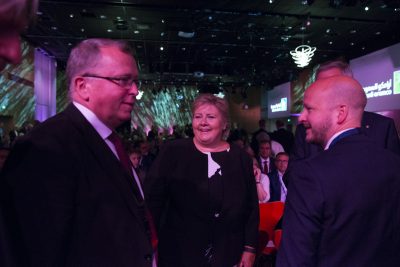Norway’s largest company, Statoil, reportedly plans to slash another 250 jobs, with this round cutting into the areas of health, safety and environmental matters. At the same time, the company continued to boast about how it’s cutting costs so much that its huge Johan Sverdrup oil field will be profitable at an oil price of just USD 25 per barrel.

While more workers worry over the prospect of losing their jobs, some Statoil executives were laughing and joking at this week’s large oil industry conference ONS, which has attracted thousands of people to Norway’s west coast oil capital of Stavanger. Statoil CEO Eldar Sætre claimed the new leaner and meaner company, with around 4,000 fewer workers than it had in 2013, will be much better braced to meet industry challenges.
Newspaper Dagens Næringsliv (DN) reported Tuesday that around 150 jobs in Statoil’s “Safety and Sustainability” unit are set to disappear along with another 100 in Statoil’s finance functions. Statoil’s “Global Business Support” division is the latest to become subject to the massive cost-cutting that began two years ago.
Others argue the cost-cutting should have started sooner, or that costs and overhead never should have risen as high as they did during the boom years of the last decade. “The entire industry needs to accept criticism for that,” Magareth Øvrum, who’s in charge of technology, projects and drilling for Statoil, told newspaper Aftenposten.
Øvrum accepted the criticism from an industry organization chief and former Labour Party politician Karl Eirik Schjøtt-Pedersen. He suggested the industry can thank itself for many of its problems since oil prices took a dive in 2014. “There has been a lack of cost-consciousness that nearly let costs go out of control,” Schjøtt-Pedersen said. “It’s serious that they allowed the cost growth we saw. The cost focus that companies have now should have been there all the time.”
That’s perhaps easier to claim now than several years ago when the booming industry faced a lack of engineers, for example, and had to pay dearly for them. This week, out-of-work engineers and other laid-off workers have been among those wandering the aisles at ONS, ready to offer their services for much less than they once were paid.
Statoil’s Øvrum, meanwhile, could talk about how Statoil and its partners on the Johan Sverdrup field have managed to reduce costs of its first construction phase by 20 percent compared to the plan they rolled out last year. New industry numbers indicate costs in some areas have tumbled as much as 40 percent, reported newspaper Stavanger Aftenblad, because of overcapacity within oil service and supply companies. Costs are down on all of Statoil’s main fields, making it easier to pump up oil and turn a profit at today’s lower oil prices.
Not everyone is working for less, though, with news breaking this week about how one top offshore executive pocketing a cool USD 17.5 million (NOK 144 million) in a lump-sum pension payment. Carl K Arnet of Oslo-based BW Offshore turned 60 this spring and is guaranteed a pension equal to 66 percent of his annual pay.
DN reported that BW Offshore’s board decided to pay out Arnet’s future pension in advance. Arnet, a Norwegian who lives abroad, had no comment. BW Offshore, which is rooted in the offshore division of the old Norwegian shipping and offshore company Bergesen, said Arnet will continue to work for BW Offshore, which reported large declines in both revenues and profits in the second quarter of this year. Its share price was trading down 8.8 percent on Monday as well.
newsinenglish.no/Nina Berglund

